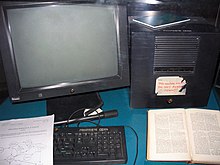| Original author(s) | Tim Berners-Lee, Ari Luotonen, Henrik Frystyk Nielsen |
|---|---|
| Developer(s) | CERN / World Wide Web Consortium |
| Initial release | 24 December 1990 |
| Final release | 3.0A
/ 15 July 1996[1] |
| Operating system | Unix, Unix-like |
| Available in | C |
| Type | Web server, proxy server |
| License | MIT Copyright Statement with acknowledgement to CERN |
| Website | www |
CERN httpd (later also known as W3C httpd) is an early, now discontinued, web server (HTTP) daemon originally developed at CERN from 1990 onwards by Tim Berners-Lee, Ari Luotonen[2] and Henrik Frystyk Nielsen.[1] Implemented in C, it was the first web server software.[3]

CERN httpd was originally developed on a NeXT Computer running NeXTSTEP, and was later ported to other Unix-like operating systems, OpenVMS and systems with unix emulation layers, e.g. OS/2 with emx+gcc. It could also be configured as a web proxy server.[1][3] Version 0.1 was released in June 1991.[4] In August 1991, Berners-Lee announced in the Usenet newsgroup alt.hypertext the availability of the source code of the server daemon and other World Wide Web software from the CERN FTP site.[5]
The server was presented on the Hypertext 91 conference in San Antonio and was part of the CERN Program Library (CERNLIB).[5][7]
Later versions of the server are based on the libwww library.[2] The development of CERN httpd was later taken over by World Wide Web Consortium (W3C), with the last release being version 3.0A of 15 July 1996.[1] From 1996 onwards, W3C focused on the development of the Java-based Jigsaw server.[8]
The initial version was public domain software; the last one was under an MIT License.[9]
By: Wikipedia.org
Edited: 2021-06-18 18:44:58
Source: Wikipedia.org